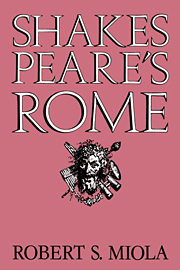Book contents
- Frontmatter
- Contents
- Acknowledgments
- Notes on sources
- I The roads to Rome
- II The Rape of Lucrece: Rome and Romans
- III Titus Andronicus: Rome and the family
- IV Julius Caesar: Rome divided
- V Antony and Cleopatra: Rome and the world
- VI Coriolanus: Rome and the self
- VII Cymbeline: Beyond Rome
- VIII Conclusion
- Index
II - The Rape of Lucrece: Rome and Romans
Published online by Cambridge University Press: 28 October 2009
- Frontmatter
- Contents
- Acknowledgments
- Notes on sources
- I The roads to Rome
- II The Rape of Lucrece: Rome and Romans
- III Titus Andronicus: Rome and the family
- IV Julius Caesar: Rome divided
- V Antony and Cleopatra: Rome and the world
- VI Coriolanus: Rome and the self
- VII Cymbeline: Beyond Rome
- VIII Conclusion
- Index
Summary
Shakespeare's The Rape of Lucrece has been judged an interesting but ungainly child. Most readers, impatient with Tarquin's revolting will and with Lucrece's stylized complaints to Night, Opportunity, and Time, agree that such rhetorical exercise impedes movement and stifles dramatic potential. As a result, The Rape of Lucrece has gained reputation as the homely younger sister of Venus and Adonis, as an awkward Ovidian exercise, further encumbered by the conventions of the popular complaint. Efforts to reevaluate the poem have not vindicated its lumbering movement, its disproportionate parts, and its excessive rhetoric; some of the more interesting, however, have called attention to the poem's importance in Shakespeare's artistic development, a topic of critical interest, J. W. Lever points out, at least since the days of Walter Whiter and Edmond Malone.
Recent commentary on Lucrece in Shakespeare's development has led almost exclusively to discussion of the great tragedies, particularly Hamlet and Macbeth. The poem presents, however, an early and full depiction of Shakespeare's Rome. It displays many of the distinctively Roman features that appear in Titus Andronicus, Julius Caesar, Antony and Cleopatra, Coriolanus, and Cymbeline. Central to its imagery is the Roman city under siege, complete with walls, outlying battlefields, a private house, and an invader. Here also is a lightly sketched portrayal of the Roman family, its values, and its significance to the city. The image of Troy rises up here, as it will later, to enrich character and clarify theme. The poem depicts a Roman struggling with Rome, the city that demands almost inhuman constancy and heroic self-sacrifice for the rewards of honor and fame.
- Type
- Chapter
- Information
- Shakespeare's Rome , pp. 18 - 41Publisher: Cambridge University PressPrint publication year: 1983



